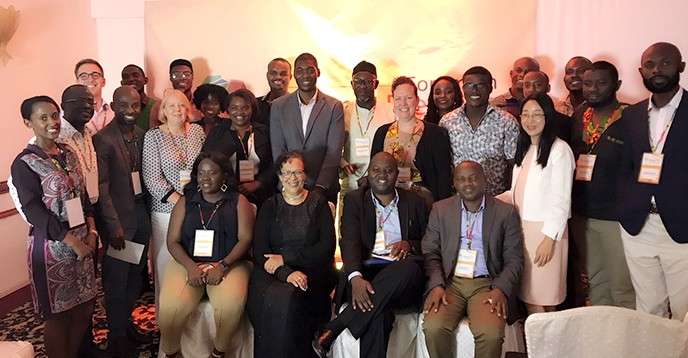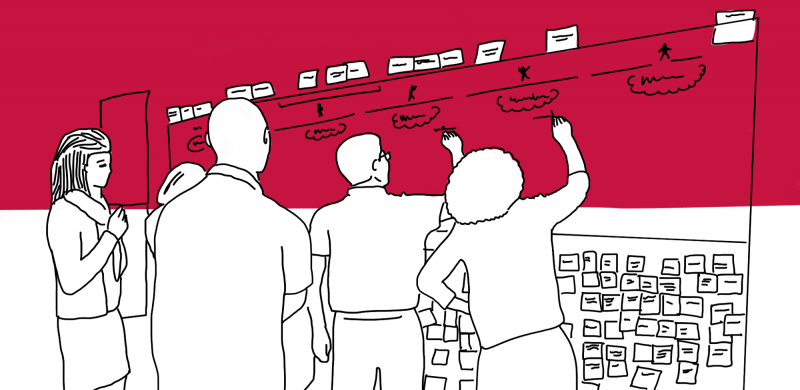FIFAfrica18 Update |
Du 26 au 28 septembre 2018 se tenait à Accra la 5è édition du Forum on Internet Freedom in Africa (FIFAfrica), auquel participait Internet Sans Frontières. J’ai eu le privilège d’y représenter l’association. Co- organisé par le Collaboration on International ICT Policy for Eastern and Southern Africa, un organisme consultatif indépendant, et la Media Foundation for West Africa, ce forum se veut un haut lieu d’échanges entre différents acteurs sur l’état et les perspectives des libertés et droits numériques en Afrique.
Les Taxes sur l’utilisation des réseaux sociaux au cœur des discussions
Il a évidemment été question des législations visant à taxer auprès des utilisateurs l’usage des réseaux sociaux et applications de messagerie, quelques jour après qu’une régulation similaire ait été retirée au Bénin, suite à une forte mobilisation des béninois, soutenue par Internet Sans Frontières. Le panel consacré aux implications économiques et sociales des taxes sur les réseaux sociaux, auquel j’ai pris part pour Internet Sans Frontières, était modéré par Sandi Chimpala de TechTrends, aux côtés du Dr. Wairagala Wakabi de CIPESA, Broc Rademan de Research ICT Africa et Kojo Boakye de l’entreprise Facebook . Au delà de l’impact économique négatif, les panélistes ont rappelé ces taxes sont porteuse d’un relent autoritariste, en ce qu’elles font peser de réelles menaces sur la liberté d’expression, et l’accès l’information. L’occasion m’a été donnée de rappeler que la victoire historique et inédite des citoyens béninois face à leur gouvernement ne doit pas faire oublier que de nombreux utilisateurs en Ouganda, en Zambie subissent encore le poids de ces régulations injustes.

L’urgence en Afrique d’adopter des indicateurs de l’universalité de l’Internet
Internet Sans Frontières a également pris part à la session organisée par l’UNESCO sur les indicateurs de l’universalité de l’Internet : fruit d’une réflexion entamée en 2017, ces indicateurs doivent permettre à chaque pays d’auto-évaluer le niveau d’universalité de l’Internet disponible dans un territoire donné, en particulier vérifier que l’Internet est fondé sur les droits humains, s’il est ouvert, accessible à tous, et fruit de la participation de plusieurs acteurs. Aux côté de James Marenga, Vice-président de l’Institut des Médias pour l’Afrique Australe (MISA), de Damola Sogunro, Principal Computer Analyst au Ministère de la Communication et des Technologies du Nigeria et de Dorothy Gordon, activiste technologique ghanéenne et spécialiste du développement, j’ai pu rappeler
les nombreux obstacles qui entravent l’accès aux informations en ligne sur le continent Africain tels que les coupures d’Internet, la restriction des libertés et la criminalisation des discours en ligne, la faible protection de la vie privée, les taxes relatives à l’usage d’Internet et le manque de transparence par rapport aux activités des gouvernements.
Plaidoyer contre les coupures Internet et données
Le panel consacré au plaidoyer axé sur les données relatives aux coupures d’Internet en Afrique a permis de rappeler le travail d’Internet Sans Frontières contre cette forme grave de censure, aux côtés de ses partenaires Access Now, the Global Network Initiative, et Netblocks, tous membres de la coalition Keepiton fondée en 2016. Les données sont nécessaires dans cette lutte, notamment celles permettant de connaitre le nombre précis de coupures Internet, mais également l’impact économique et financier de celles-ci. En 2017, le premier calcul par Internet Sans Frontières du coût économique de la coupure totale d’Internet dans les régions anglophones du Cameroun, la plus longue à ce jour en Afrique, a permis d’intéresser un tout nouveau public au plaidoyer contre la censure sur Internet, en particulier les médias et institutions économiques et financières. D’où l’importance de l’outil COST (Cost of Shutdowns Tool), développé par l’organisation Netblocks, qui automatise le calcul du coût des coupures Internet.
FIFAfrica, un espace de discussion et de collaboration nécessaire
J’ai pu constater à travers ma participation que le FIFAfrica est un creuset qui permet de débattre de manière interactive et éclairée sur les enjeux et défis actuels de la société de l’information en Afrique.
Vous pouvez en apprendre d’avantage sur la 1ère participation d’Internet Sans Frontières à ce grand RDV africain dans ce podcast d l’émission Afrique 7 jours de la Deutsch Welle.
The Digital Economy in Sub-Saharan Africa: What’s Missing?
By Kesa Pharatlhatlhe |
The global digital economy continues to grow, fueled by the increasing migration of social interactions, economic activities, and transactions online. Indeed the Information and Communications Technology (ICT) sector is powering various activities, such as banking, buying and selling goods and services, and access to health, education and entertainment.
In Africa, innovation, increasing affordability of hardware and internet connectivity are propelling the continent’s digital economy, but there remain challenges to growth. Internet penetration in Africa stands at 21.8% of the population, leaving the majority of the continent’s population offline.
According to the GSMA, the number of SIM cards in use in Sub-Saharan Africa reached 731 million at the end of 2016, and is expected to rise to nearly one billion by 2020. By this time, the number of mobile broadband connections will reach half a billion, more than double the number at the end of 2016.
The use of mobile-based financial transaction platforms has grown exponentially, bringing the unbanked population and the informal sector in the majority of Africa’s developing countries to more structured financial transaction systems. Additionally, digital applications have encouraged the growth of micro, small and medium-sized enterprises through access to ICT-enabled financial services and marketing. In turn, the digital economy’s contribution to Africa’s gross domestic product (GDP) continues to grow.
Various domestic e-platforms have emerged in the region, indicating that the African digital economy landscape has positive prospects. In Nigeria, for example, Asuqu connects small businesses to creative individuals and professionals for freelance services. Then there is Jumia, whose parent company surpassed the US$ 1 billion market value in 2016. Jumia offers ecommerce services (retail, travel, food) in various African countries including Cameroon, Côte d’Ivoire, Egypt, Ghana, Kenya, Morocco, Nigeria and Uganda, Other examples of notable online platforms in Africa include Esoko (Ghana), mFarm (Kenya) and Novus Agro (Nigeria).
However, the region’s limited internet access, low purchasing power, high levels of illiteracy and poor infrastructure, among others, have affected the pace of growth of these platforms.
Affordability poses another challenge. A World Bank report on digital dividends shows that on average internet access costs US$206.6 per Mbit/s per month in coastal countries in Africa, compared to a whooping US$ 438.82 per Mbit/s per month in landlocked countries. Chad, Cameroon, Equatorial Guinea, Lesotho, Mali and Niger have some of the highest access costs.
Nonetheless, some coastal countries like South Africa which has four undersea fibre optic cable systems, have ongoing campaigns against high data prices. Indeed, according to the Alliance for Affordable Internet (A4AI), very few countries in Africa meet the “1 for 2” target for affordable internet where 1GB of mobile data should not cost more than 2% of the average citizen’s monthly income. Currently, citizens in several African countries would need to spend up to 9.3% of their average income to access broadband data.
Furthermore, the absence of relevant data for the ICT sector, such as e-ecommerce statistics, is impacting on the capacity of states to make informed policy and implementation decisions. Moreover, the continued practice to shut down or disrupt internet, has negative consequences for the digital economy. Besides, as applause rings for the capacity that African countries have for “leapfrogging” in the digital age, often under-looked is the impact that this has on relevant local content, adequate localisation of technologies, policy development and a widening gender digital divide.
As such, there is a need to review and update existing regulatory frameworks to deal with emerging issues and new technologies. The absence or poor implementation of laws such as on cybersecurity, data protection and privacy, could slow down the momentum of Africa’s digital economy growth. Although various national broadband strategies have been released by countries in a bid to coordinate broader actions on issues related to technology use, unless the aforementioned gaps are addressed, the realisation of these policies will continue to face an uphill battle.
Governments need to design policies and regulations to significantly increase broadband deployment (especially to rural areas to bridge the urban-rural divide) and investment in the tech sector through Public-Private-Partnerships – extending tax incentives for infrastructural investment to private businesses.
There is also pressing need to integrate a gender perspective in all relevant policies and strategies and to make a concerted effort to mainstream women empowerment in strategies, policies, and budgets addressing issues of gender equality, as well as focusing on accessibility, affordability, safety and digital skills in Africa.
All in all, more still needs to be done to advance the digital economy in Sub-Saharan Africa and ultimately shift from being consumers of technology goods and services to originators of disruptive tech.
Solving Uganda’s Challenges through Data & Service Design
Last week, we asked “What is Service Design?” and answered our question with “Service design is the process of taking a service and better tailoring it to the needs and wants of the end user, whether that’s a client, customer or in the case of civic service design, the citizen. It could be improving an existing service, or creating a new service totally from scratch.”
On December 5th, Pollicy and the Collaboration in International ICT Policy for Eastern and Southern Africa (CIPESA) brought back the civic technology community in Uganda, but this time, with a focus on data and design. As issues of data ownership, digital security, censorship become more pertinent in our society, so does the need to appropriately harness the benefits of big data. Through a series of interesting panel discussions, lightening talks and a hands-on design training, we took participants through a journey on how data can be used to revolutionize how citizens and governments interact for mutual benefit.
Are you a techie that's looking to harness technology and design for the public good?, SIGN UP to attend this event;
Civic Technology in Uganda: A Data & Design Perspective
Details:https://t.co/Z3pe8a5gB8 pic.twitter.com/WkjoZWGKd2
— Pollicy (@PollicyOrg) November 24, 2017
We first tackled the hard issues around the ethics of data in improving service delivery in Uganda through a panel discussion analyzing the issue from the perspective of the Ugandan Police Force, human rights defenders and the healthcare industry. Mr.Jimmy Haguma, the Acting Commissioner of Police — IT & IM, Mr.Neil Blazevic from DefendDefenders Tech Unit and Mr.Samson Jarso from Andromeda Innovations led the panel moderated by Pollicy’s own Patricia Navvuga.
"Every time we're using platforms linked to other platforms then we're no longer on private mode. The internet is public" – Jimmy Haguma on cyber security and safety #CivicTechUg #Uganda pic.twitter.com/CSkYZcIH7Q
— ICT4DemEA (@ICT4DemEA) December 5, 2017
Mr John Kalyesubula and Mr Francis Ddamulira (Not in Photos) from @UmemeLtd talking about how they are using big data to improve public service delivery #civictechug #bigdata #ict4dem pic.twitter.com/BpH25JM7wB
— Pollicy (@PollicyOrg) December 5, 2017
In the afternoon, after a networking lunch we came together as a group to tackle challenges using the principles of service design, facilitated by Design without Borders. Using a process of iterative prototyping, our faciliators Lawrence and Rachit discussed how they conduct user research, ideate and convert their ideas in prototypes which they extensive test with their end users until completely satisfied with the user journey.
The #servicedesign Process has a pretty simple formula;
1. Research
2. Ideation
3. Conceptualization
4. Prototyping
5. Testing
6. Implementation#CivicTechUg 🇺🇬 pic.twitter.com/WbISCxpAag— Pollicy (@PollicyOrg) December 5, 2017
Service design creates better citizen and staff experiences while at the same time reducing inefficiencies and increasing value to society. Think of all the time, money and mental energy saved by improving upon the processes listed below.
As small groups 6–7 participants, we tackled three main challenges:
1. Public Transport in Kampala in quite inefficient
2. Obtaining a new passport is troublesome
3. There is a lack of monitoring of public complaints
The teams take on the first step of Problem Definition in the process of #servicedesign pic.twitter.com/VhS9Epnh4n
— Pollicy (@PollicyOrg) December 5, 2017
From our discussions, we realized that the solutions could be readily implemented by thinking of the issues holistically. In the previous blog post, we looked at the example of acquiring a new passport here in Uganda, and quite fittingly worked on the same issue in one of the small groups.
The group, working through the National ID or a temporary National ID, presented a simple online solution for registering linked information and obtaining feedback throughout the process via e-mail, SMS and by logging into the online portal to check on the status of the submission.
For public transportation, a colour-coded and numbering system for public minibuses and buses was offered as a solution to ease unruly drivers, unknown bus routes and improve connections between routes. For public complaints monitoring, the AskYourGov system was offered as a potential solution by engaging numerous government officials through one centralized portal.
What we took away from the session was that even though we were able to come up with these ideas in 1–2 hours, the solutions seemed readily implementable. But looking at the service design processes, we need to do further research with end user and to first prototype these concepts with small groups of users to perfect the process.
Getting to work hands-on on current pressing issues in Uganda was an eye-opening experience and we hope to bring in more members of the civic technology community together with government to problem solve some of these challenges using data and design principles.
For more information on service design, check out the Service Design Toolkit: http://www.servicedesigntoolkit.org/ and content from Interaction Design Foundation: https://www.interaction-design.org/literature/topics/service-design
We’re thankful for everyone who showed up and remained engaged the entire time, and for our partner CIPESA on making this event possible!
On to the next!
We can choose to talk about #data and #civictech all day but we can only do so if we know each other. Folks got a chance to do an Ice-breaker to get to know each other over coffee. #CivicTechUg pic.twitter.com/tnqq8Z8PyI
— Pollicy (@PollicyOrg) December 5, 2017



